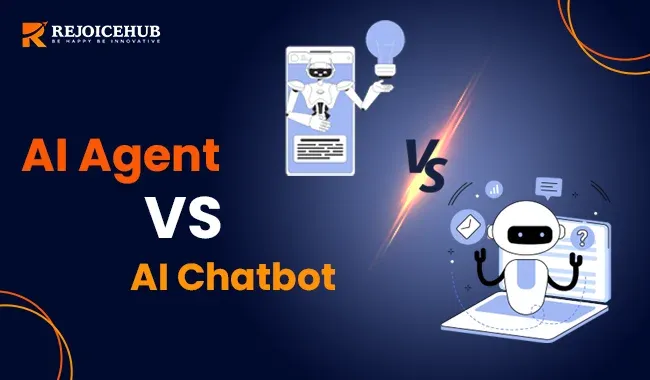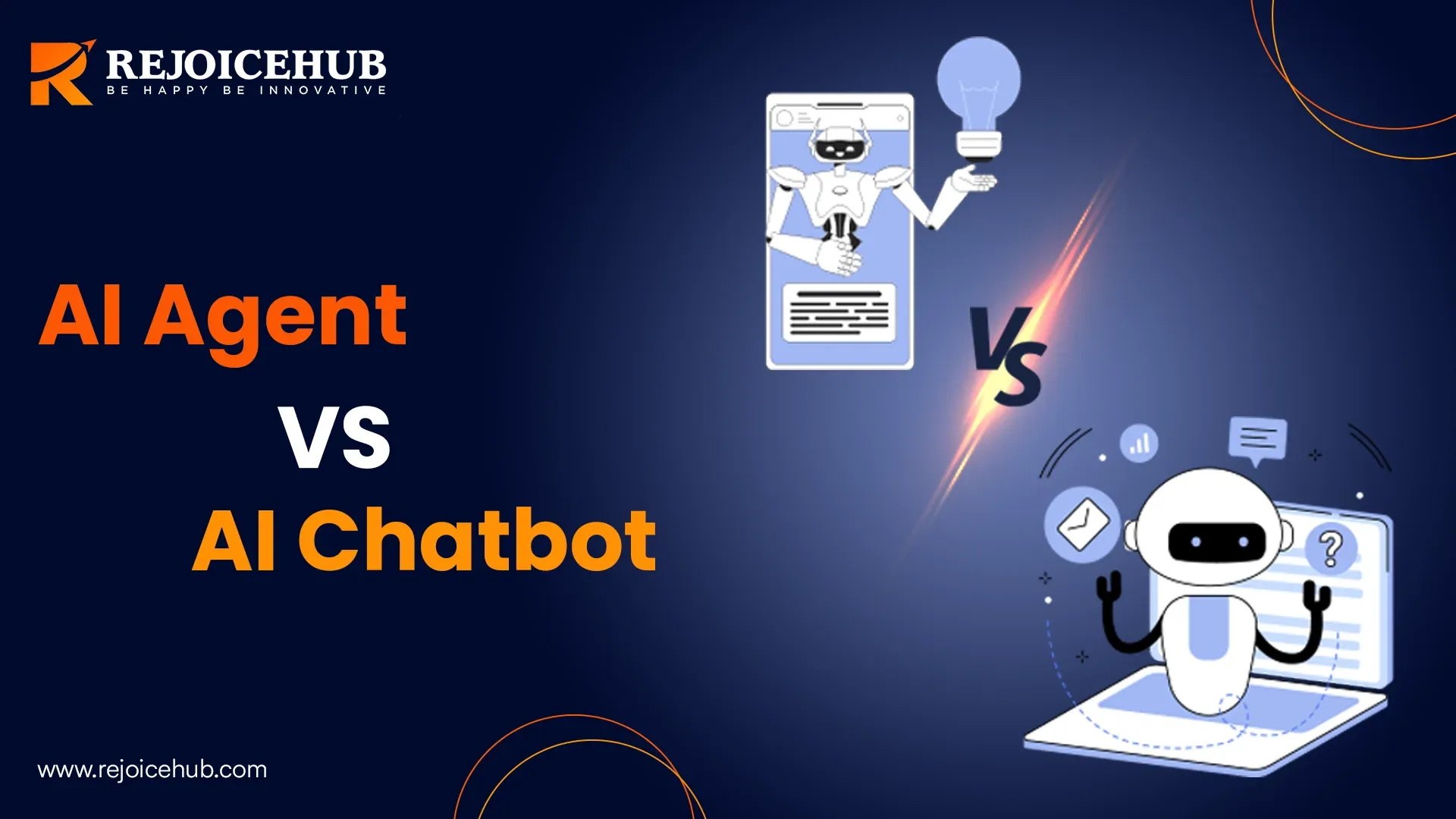
AI is no longer a distant sci-fi dream. It’s in your pocket, on your desktop, and greeting you on websites with a friendly message. One moment you’re typing questions to a “live chat,” and the next, you realize you might be chatting with an algorithm. That’s how chatbot ai often works. Yet there’s another star in the AI universe: the AI agent. When people ask, “what is an AI agent,” they’re talking about something more robust than a simple text-based helper. This agent can schedule shipments, track trends, and even act on your behalf. Meanwhile, when someone says, “what is a chat bot,” they typically mean that quick question-and-answer tool we see on many sites. Both forms of AI handle communication, but they have key differences. Let’s break it all down step by step.
Quick Summary
An Ai chatbot is the online greeter you see on many websites. It answers simple questions, like “Where’s my order?” or “What are your hours?” An AI agent, on the other hand, can dig into data, make logical decisions, and do more than just chat. Think of the chatbot as a friendly front-desk clerk, and the AI agent as the big-shot manager who runs deeper operations.
What is an AI Chatbot?
Picture a small box that pops up in the corner of a webpage. It says, “Hi there, how can I help?” That’s likely an AI chatbot. It’s designed to answer questions or offer assistance through text or voice. People often ask, “what is AI chatbot technology?” It’s basically software that can understand your query and respond in a way that feels natural. Some chatbots follow preset scripts. Others use machine learning to interpret questions, spot keywords, and dish out suitable answers.
This type of tool is popular because it cuts wait times and saves businesses money. No more leaving customers on hold or forcing them to wade through endless FAQ pages. The chatbot takes center stage, giving quick replies about return policies, store hours, or shipping details. It keeps interactions short and sweet. By doing so, it frees human staff to tackle more complicated tasks.
AI Chatbot Use Cases
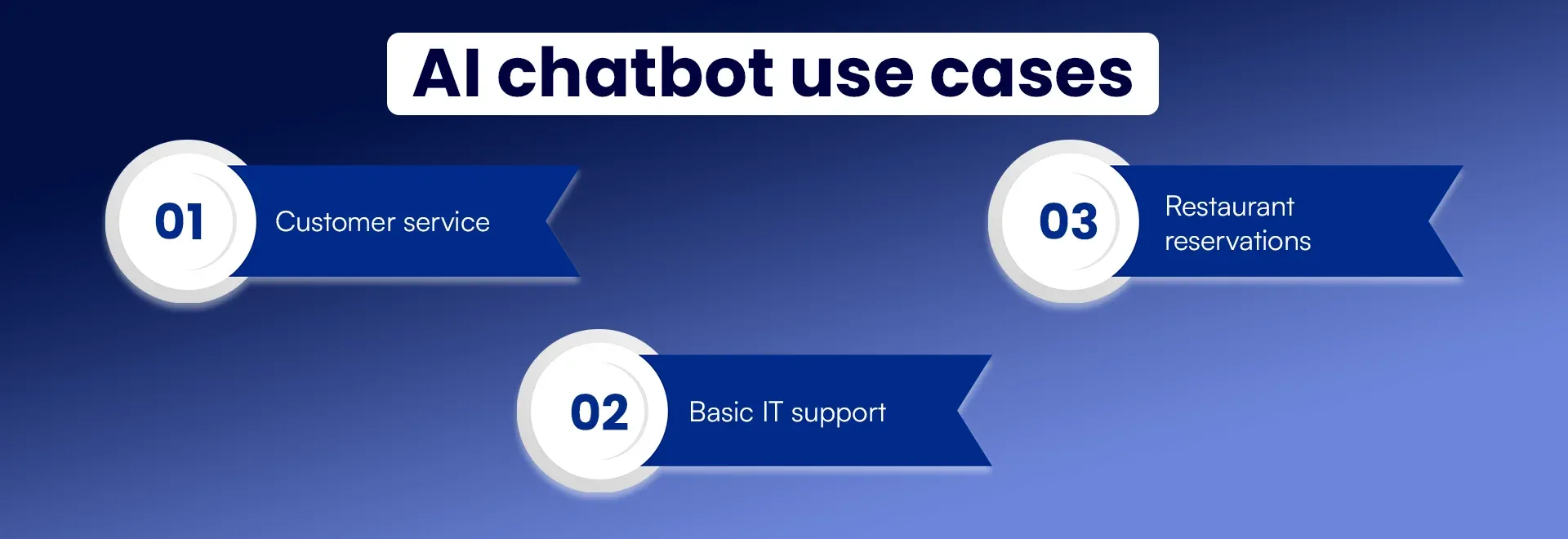
1. Customer service
Let’s say a user lands on your website at midnight, asking about a refund. A chatbot can help, even when human agents are asleep. That’s the charm of chatbot ai in customer service. It provides instant replies to simple questions, reducing the need for large phone support teams. Customers get quick answers. Businesses save time and money. Everybody leaves happy (or at least less grumpy).
2. Basic IT support
We’ve all forgotten a password. That’s where an Ai chatbot can shine. It guides you through a reset, maybe even checks if your account is locked, and points you to the correct form. You don’t need a full-blown phone call for that. Instead, the chatbot does the heavy lifting of answering repetitive queries, letting human tech pros handle real emergencies.
3. Restaurant reservations
Calling a busy restaurant can lead to endless ringing or music. An Ai chatbot fixes that. You visit the eatery’s site or social page, type your desired time and date, and get an answer instantly. If the restaurant is full, you might get a suggestion for another slot. No phone tag. No wasted time. That’s straightforward convenience.
What is an AI Agent?
Now we move beyond Q&A. The question “what is an ai agent” points to something bigger than a mere chatting tool. This system can connect to databases, analyze large sets of information, and even make decisions or trigger events on its own. Unlike a chatbot, which mostly reacts when you poke it with a query, an AI agent can initiate processes by itself.
Imagine it tracking your company’s inventory, noticing that some items are running low, and placing an order before you even realize you’re almost out. It’s not just regurgitating info. It’s taking action. AI agents can also learn patterns, update their strategies, and refine goals over time. While a chatbot might say, “Sure, I can book that,” an AI agent can figure out the best supplier, compare shipping times, and schedule deliveries without a human lifting a finger.
AI Agent Use Cases
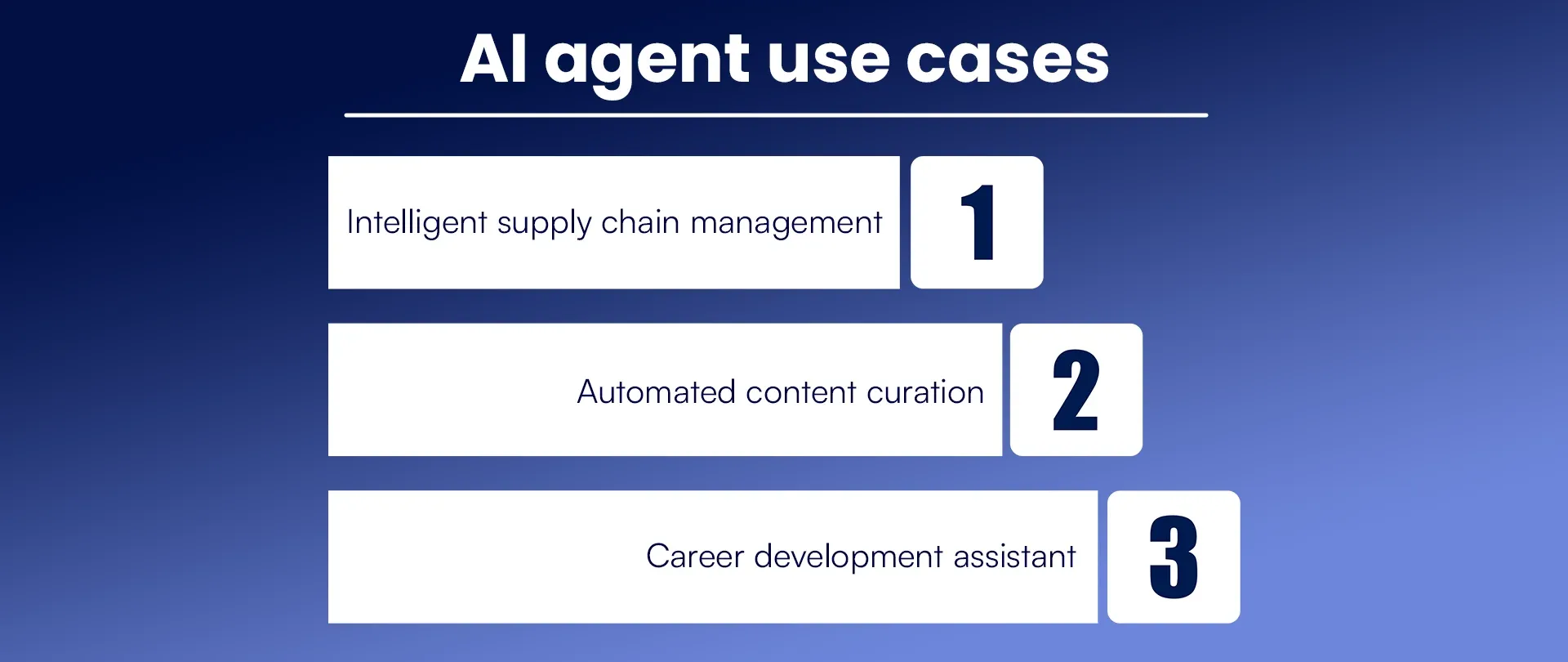
1. Intelligent supply chain management
Picture a digital helper that scans multiple warehouses, checks real-time sales data, and predicts future demand. That’s what an AI agent does. It places purchase orders when stock runs low, redirects shipments to where they’re needed most, and flags issues for you before they become full-blown disasters. This is way beyond answering “When will my package arrive?” It’s a deeper level of oversight.
2. Automated content curation
Ever wonder how news sites or social platforms seem to read your mind? An AI agent might be hard at work. It reviews user interests, trending topics, and engagement metrics, then lines up the best articles or videos. Unlike a chatbot that fields direct questions, the agent works in the background, picking and choosing content so you don’t have to scroll through heaps of irrelevant posts.
3. Career development assistant
In a corporate setting, an AI agent can examine your skills, study your performance, and suggest training programs. It might spot job openings that match your profile and let you know before anyone else. It’s not just answering surface-level inquiries like a chatbot would. Instead, it processes deeper insights and pushes you to level up in your chosen field.
Also read: AI vs Machine Learning | what is key Difference and Benefits
Differences between AI Chatbots vs AI Agents
Let’s cut to the chase. A chatbot is mainly a conversational whiz. It fields user questions, offers short solutions, and keeps the talk moving. An AI agent, though, is a digital worker that can read data from multiple sources, identify patterns, and do things automatically. Chatbots are great for direct user engagement. AI agents can manage operations that go beyond typed chats.
Learning is another major difference. Some chatbots adapt, but many rely on strict scripts. AI agents typically have more advanced algorithms. They can refine their decisions over time, becoming sharper. Also, the scope of knowledge sets them apart. A chatbot might excel at frequently asked questions. An AI agent could handle complex tasks like restocking a warehouse, scheduling staff, or analyzing large volumes of data. The deeper the needs, the more likely you want an AI agent.
Will AI Agents Replace Chatbots?
Some folks think chatbots will vanish as soon as AI agents take the stage. But that’s not quite right. Both serve unique roles. Chatbots are cheaper, simpler to set up, and perfect for quick user interaction. AI agents often need bigger budgets and more extensive data connections. So, if all you need is a digital greeter to answer basic queries, a chatbot has you covered. If you require a system that reviews analytics and takes initiative, you might want an AI agent. They can coexist in the same organization. One is the digital face that chats with customers, while the other does the heavier work behind the scenes.
How to Choose Between an AI Chatbot and an AI Agent
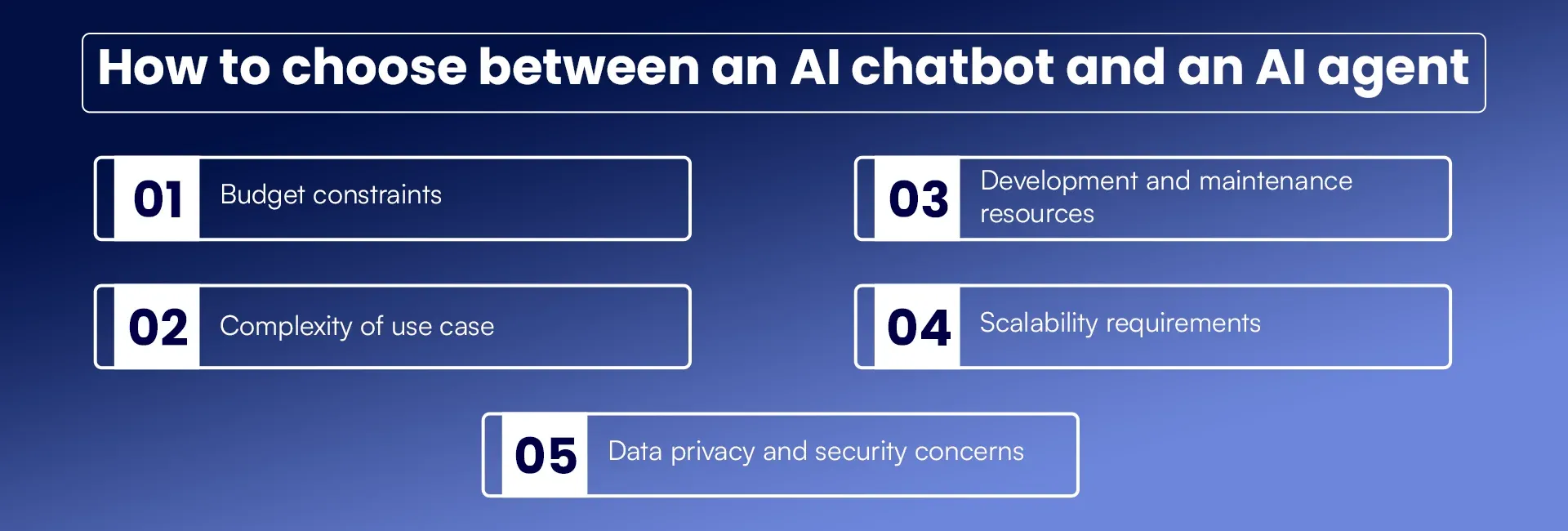
1. Budget constraints
Money talks. Chatbots cost less because they usually stick to conversation flows. AI agents often involve building or integrating more complex systems. If you have limited funds, start with a chatbot. If you’re ready to invest in advanced data handling, then an AI agent could be your next step.
2. Complexity of use case
If you only need to answer simple questions or help users place orders, a chatbot fits nicely. But if you want something that checks your databases, monitors workflows, and makes decisions, you’ll need an AI agent. The deeper your needs, the more likely you’ll go for the agent.
3. Development and maintenance resources
Setting up a basic chatbot can be a weekend project with off-the-shelf tools. An AI agent, though, might need skilled developers who can integrate APIs, set up logic, and ensure constant updates. If your team is small and time is scarce, a chatbot is more practical. If you’ve got the manpower, an AI agent is within reach.
4. Scalability requirements
A chatbot can handle more users by adding server capacity, but it’s still mostly text-based Q&A. If your operation demands large-scale automation, an AI agent is the more flexible choice. It can expand across different tasks and keep growing with your data needs. Chatbots don’t usually handle cross-department complexity.
5. Data privacy and security concerns
Chatbots generally log user chats. AI agents might connect to multiple data pipelines, which raises security concerns. More data means more points of vulnerability. If you’re in a regulated industry, you’ll need a solid security plan for any advanced AI agent. Chatbots, meanwhile, can be simpler to secure if they just address basic queries.
Conclusion
So, which one do you choose? If you only need a digital receptionist, a chatbot is perfect. If you want a digital manager that crunches data and tackles heavy tasks, an AI agent is your star. Both have a place in modern tech. It’s not a matter of picking a winner. It’s about matching your goals, budget, and complexity level. Chatbots make sense for simple interactions. This is where AI shines, for decisions that must happen in real time without the aid of a human in the loop.
Rejoice Company has collaborated with advanced AI agent services and cutting-edge AI/ML solutions to help businesses unlock their maximum capacity. Choose your fighter well and remain ahead of the curve.
Frequently Asked Questions
1. What is ai chat bot technology and how does it differ from older chat systems?
Older systems followed strict scripts. If you veered off-topic, they got confused. But what is ai chatbot technology? It’s software that matches your input with probable answers, often with added machine learning. It’s more flexible and can adapt to user phrasing. That’s the key difference: older systems were rigid, while modern AI chatbots can handle wider variations.
2. How does chatbot help small businesses?
Chatbot ai saves time and money. It answers routine questions, so staff can work on pressing tasks. It also provides after-hours support. Customers get instant replies at any hour, reducing wait times. That boosts user satisfaction and can lead to repeat sales. For a small business, it’s a valuable way to keep people happy without breaking the bank on extra employees.
3. What is an AI agent, and do I need one if I already have a chatbot?
When people say, “what is an AI agent,” they refer to a system that doesn’t just chat—it can gather info, analyze patterns, and perform tasks. If you already have a chatbot handling surface-level questions, an AI agent might add deeper services behind the curtain. It could handle stock management, schedule tasks, or optimize processes. You’d only need one if you aim for broader automation.
4. Does Ai chatbot require coding skills to implement?
Many platforms let you build an Ai chatbot with minimal coding. They offer drag-and-drop interfaces or templates. For more advanced features or custom logic, you might need a bit of scripting. But for a basic Q&A setup, you can get by with user-friendly tools. It’s often enough to fill in your content, set response flows, and launch it on your site.
5. Will chatbot ai eventually take over all customer support roles?
Probably not. Chatbot ai is great for quick fixes but can’t replace human empathy or problem-solving in tricky situations. Complex issues often demand a real person who can reason, show understanding, and handle unique cases. So, while chatbots can cut down on simple queries, they’re unlikely to wipe out human support. A blended approach—bots plus real folks—is usually the best balance.
